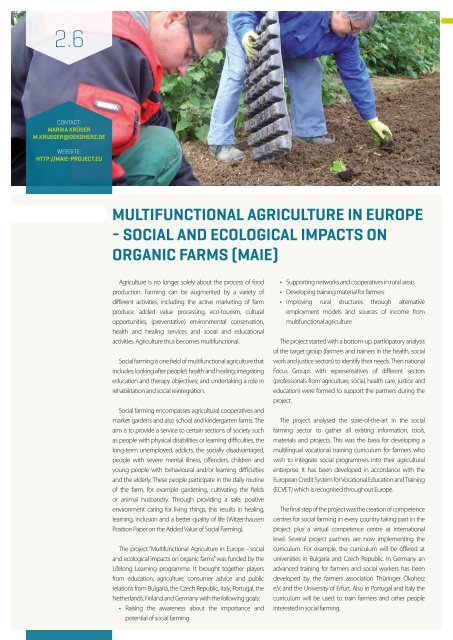tpo_dossier_action-plan-for-innovation-and-learning_201406
tpo_dossier_action-plan-for-innovation-and-learning_201406
tpo_dossier_action-plan-for-innovation-and-learning_201406
You also want an ePaper? Increase the reach of your titles
YUMPU automatically turns print PDFs into web optimized ePapers that Google loves.
2.621CONTACT:MARIKA KRÜGERM.KRUEGER@OEKOHERZ.DEWEBSITE:HTTP://MAIE-PROJECT.EUMULTIFUNCTIONAL AGRICULTURE IN EUROPE- SOCIAL AND ECOLOGICAL IMPACTS ONORGANIC FARMS (MAIE)Agriculture is no longer solely about the process of foodproduction. Farming can be augmented by a variety ofdifferent activities, including the active marketing of farmproduce, added value processing, eco-tourism, culturalopportunities, (preventative) environmental conservation,health <strong>and</strong> healing services <strong>and</strong> social <strong>and</strong> educationalactivities. Agriculture thus becomes multifunctional.Social farming is one field of multifunctional agriculture thatincludes: looking after people’s health <strong>and</strong> healing; integratingeducation <strong>and</strong> therapy objectives; <strong>and</strong> undertaking a role inrehabilitation <strong>and</strong> social reintegration.Social farming encompasses agricultural cooperatives <strong>and</strong>market gardens <strong>and</strong> also school <strong>and</strong> kindergarten farms. Theaim is to provide a service to certain sections of society suchas people with physical disabilities or <strong>learning</strong> difficulties, thelong-term unemployed, addicts, the socially disadvantaged,people with severe mental illness, offenders, children <strong>and</strong>young people with behavioural <strong>and</strong>/or <strong>learning</strong> difficulties<strong>and</strong> the elderly. These people participate in the daily routineof the farm, <strong>for</strong> example gardening, cultivating the fieldsor animal husb<strong>and</strong>ry. Through providing a safe, positiveenvironment caring <strong>for</strong> living things, this results in healing,<strong>learning</strong>, inclusion <strong>and</strong> a better quality of life (WitzenhausenPosition Paper on the Added Value of Social Farming).The project “Multifunctional Agriculture in Europe - social<strong>and</strong> ecological impacts on organic farms” was funded by theLifelong Learning programme. It brought together playersfrom education, agriculture, consumer advice <strong>and</strong> publicrelations from Bulgaria, the Czech Republic, Italy, Portugal, theNetherl<strong>and</strong>s, Finl<strong>and</strong> <strong>and</strong> Germany with the following goals:• Raising the awareness about the importance <strong>and</strong>potential of social farming• Supporting networks <strong>and</strong> cooperatives in rural areas• Developing training material <strong>for</strong> farmers• Improving rural structures through alternativeemployment models <strong>and</strong> sources of income frommultifunctional agricultureThe project started with a bottom-up, participatory analysisof the target group (farmers <strong>and</strong> trainers in the health, socialwork <strong>and</strong> justice sectors) to identify their needs. Then nationalFocus Groups with representatives of different sectors(professionals from agriculture, social, health care, justice <strong>and</strong>education) were <strong>for</strong>med to support the partners during theproject.The project analysed the state-of-the-art in the socialfarming sector to gather all existing in<strong>for</strong>mation, tools,materials <strong>and</strong> projects. This was the basis <strong>for</strong> developing amultilingual vocational training curriculum <strong>for</strong> farmers whowish to integrate social programmes into their agriculturalenterprise. It has been developed in accordance with theEuropean Credit System <strong>for</strong> Vocational Education <strong>and</strong> Training(ECVET) which is recognised throughout Europe.The final step of the project was the creation of competencecentres <strong>for</strong> social farming in every country taking part in theproject plus a virtual competence centre at internationallevel. Several project partners are now implementing thecurriculum. For example, the curriculum will be offered atuniversities in Bulgaria <strong>and</strong> Czech Republic. In Germany anadvanced training <strong>for</strong> farmers <strong>and</strong> social workers has beendeveloped by the farmers association Thüringer Ökoherze.V. <strong>and</strong> the University of Erfurt. Also in Portugal <strong>and</strong> Italy thecurriculum will be used to train farmers <strong>and</strong> other peopleinterested in social farming.


